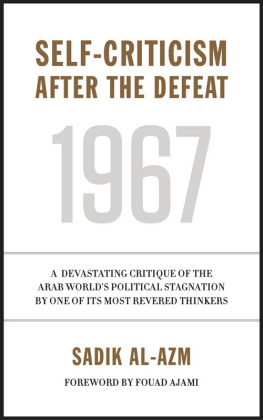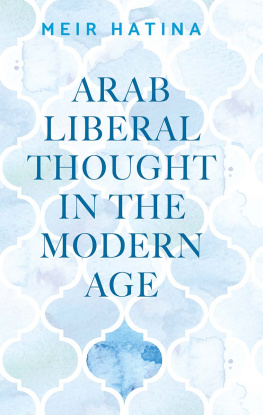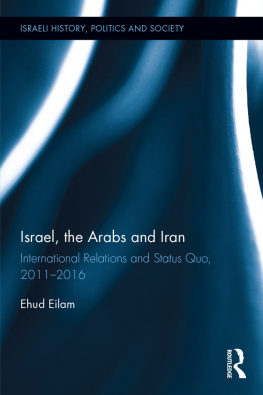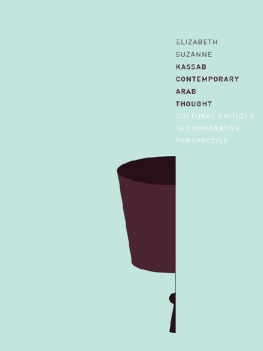eISBN 978-0-86356-484-0
First published 1968 by Dar al-Taliah [Vanguard Press]
Printing and Publication, Beirut
First English print edition published 2011 by Saqi Books
This eBook edition published 2011
Copyright Sadik al-Azm 1968 and 2011
Translation George Stergios 2011
All rights reserved. No part of this book may be reproduced or transmitted in
any form or by any means, electronic or mechanical, including photocopying,
recording or by any information storage and retrieval system, without permission
in writing from the publisher.
This book is sold subject to the condition that it shall not, by way of trade or otherwise, be lent, re-sold, hired out, or otherwise circulated without the publishers prior consent in any form of binding or cover other than that in which it is published and without a similar condition including this condition being imposed on the subsequent purchaser.
A full CIP record for this book is available from the British Library.
A full CIP record for this book is available from the Library of Congress.
SAQI
26 Westbourne Grove, London W2 5RH
www.saqibooks.com
A Book and Its Truth:
Sadik al-Azms Self-Criticism after the Defeat
FOUAD AJAMI
At the remove of some four decades, I still recall the startling surprise with which I read Sadik al-Azms Self-Criticism after the Defeat. I was in my early twenties, the Six Day War of June 5 1967, was then a year old. My generation had not fully taken in the defeat of the Arab armies in that war. We had come into our own in the aftermath of the Suez War, we had been told that a new Arab world had arisen, and that the Egyptian Gamal Abdel Nasser had conceived a world free of the old doubts and compromises and weaknesses. We had hung on the mans words: the Beirut of my boyhood at least the Muslim part of it was Nassers, as were, it is easy to recall, vast swaths of the Arab world. The defeat served a notice on all that: Arab political life would never be the same.
Yet for all the enormity of that defeat the loss of the Golan Heights, and the West Bank and Gaza, the flight of the Egyptian army, the shame that attended the defeat in a culture of pride young Arabs didnt have the language and the intellectual equipment to describe what had befallen their world. We had abandoned God and God abandoned us, said what we would later come to describe as the Islamists. We had assaulted the proper order of things property and hierarchy and tradition said the monarchists and the traditionalists: we had filled the earth with sedition, and had reaped the whirlwind. A liberal or two said that the Arabs needed a scientific culture and modern armies as though those could be bought off the rack, as though their absence said nothing about the contemporary condition of the Arabs.
It was into that great confusion that Sadik al-Azm, an American-educated philosopher of Syrian birth then teaching at the American University of Beirut, published his seminal book. Everything about Self-Criticism after the Defeat announced that a new age of Arabic letters and Arabic writing had begun. The book was brief and unadorned when the Arabic writing had hitherto been ponderous and flowery. There was truth in the book, and candor, a courageous man taking on the pieties and the beliefs of that era. Sadik al-Azm belonged to a bigger world than the Beirut and Damascus of his time. He was highly educated (a Ph.D. in philosophy from Yale), he was widely read, he saw the Arab defeat for what it was: an indictment of Arab culture, a verdict on the sort of world that the military officers and the revolutionaries of the era had built. For the preceding decade, Arabs had fought a sterile ideological battle the American political scientist Malcolm Kerr had dubbed it the Arab Cold War that pitted the monarchies in Jordan, the Arabian Peninsula, and the Gulf against Gamal Abdel Nasser and his generation.
Al-Azm was a political heretic: he saw no great discontinuity between the Old Order that had lost the battle for Palestine in 1948 and the New Men who lost this new war two decades later. Little had changed in the intervening years, he wrote. The New Men had been a colossal failure, and al-Azm called upon the Arabs, on the seventh day of this Six Day War (to use the language of the Israeli writer Meron Benvenisti) to see their world for what it was. He was a man without illusions: I dont think he saw the onset of a revolution that would remake Arab culture. True, he began his book with a powerful precedent: the defeat of Tsarist Russia at the hands of Japan in 19041905. He saw, and worked with a historical analogy: a big, traditional empire, steeped in superstition and tyranny, defeated by a smaller, more modern power. Like the Russians who thought that they would push those impudent Asiatics into the sea, the crowds in the Arab world had been sure of victory. These were Zionist gangs on the battlefield, it was said. No one had prepared that Arab street for the possibility of defeat: the armies were big, bloated institutions, and the hero-leader, Gamal Abdel Nasser, cast his spell over the crowd. There was no reason, no sober analysis, amid the crowd, only passion and belief. No one had told ordinary Arabs that Israel was there to stay, that she had won the struggle for statehood on her own, that the verdict of the 1948 war could not be reversed. A Moroccan historian, Abdullah Laroui, poignantly depicts the popular Arab attitude on this great question: on a certain day everything would be obliterated and instantaneously reconstructed and the new inhabitants would leave, as if by magic, the land that they have despoiled; in this way will justice be dispensed to the victims, on that day when the presence of God shall again make itself felt.
God had failed the Arabs on June 5th, and political magic had failed them as well. This was a captive population for all practical purposes, the world beyond was in on the magnitude of the Arab defeat, but the vast majority of Arabs had turned away from the verdict of the war. On June 9th, Nasser submitted his resignation, but the believers would have none of that. They held onto their wounded hero, and Sadik al-Azm saw nothing here similar to the self-criticism and upheaval that had hit Russia in 1905. Al-Azm was writing in the immediate aftermath of the Arab defeat. By the Russian calendar, it had taken a dozen years before the autocracy had been brought down: the external forms of Russian life were emptied of meaning. Al-Azm couldnt be sure if the dominant order of Arab power would hold. He and others of his outlook, intellectuals and writers stung by the military defeat, were now given to the belief that the word could perhaps remake the political world. Beirut was the home of this breed of young intellectuals, and al-Azm (of aristocratic Damascene family the al-Azms were one of the great families of Syrias land-owning aristocracy) was to emerge as perhaps his generations most influential public intellectual. Nothing was beyond the scrutiny of this band of writers. The official world had been exposed, the pamphleteers and the writers were on their own, and the armed men were soon to follow the Palestinian fighters, the fedayeen, who became the other symbol of this time of tumult in the life of the Arabs.
It was easy at the time to exaggerate the weakness of the dominant order the monarchs in Jordan and the Arabian Peninsula, the military regimes in Cairo, Damascus, and Baghdad. The order seemed, on the face of it, ripe for the plucking. The men who shaped public discourse could be forgiven the thought that the whole big edifice of the ruling order could be toppled. The men in the saddle were willing to bide their time. This revolutionary moment, the military autocrats and the dynasties reasoned, was destined to pass. Six years after the defeat of 1967, the dominant order would mount its rear-guard action: the October War of 1973. New oil wealth would come to the Arabs, and a legend could be offered ordinary men and women that a new era of Arab power beckoned. But men are never given the gift of prophecy: the intervening years between those two wars spawned expectations of imminent change.








